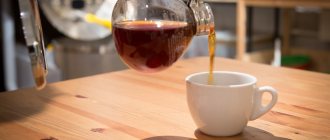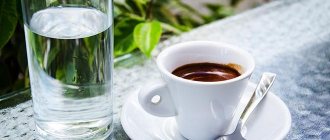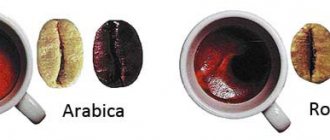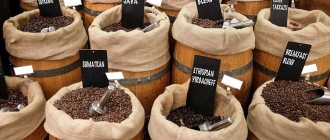Why coffee makes you want to go to the toilet.
Natural coffee beans contain a huge number of parts, each of which has a certain effect on the body. Therefore, a cup of coffee not only gives vigor and pleasure, but also activates physiological processes. Researchers know exactly why coffee makes you want to go to the toilet, and have even compiled special tips for drink lovers: how and when to drink it so as not to end up in an uncomfortable position.
Is coffee a diuretic?
The drink made from coffee beans has mild diuretic properties. Scientists have roughly learned the mechanism of the diuretic effect of coffee.
- Caffeine, which enters the body, causes increased production of hormones and activates the adrenal glands.
- Blood flow to the kidneys increases, which prevents sufficient sodium absorption.
- Excess sodium requires excretion, so the body activates the bladder to remove excess sodium.
This explains the diuretic effect of coffee. True, doctors believe that this mechanism has not yet been fully clarified and research is ongoing. The latest data generally puts a symbol of equality between coffee and any other liquid, because if you drink a glass of ordinary water, then a diuretic effect will also be observed simply due to the fact that the body strives to maintain water balance.
The diuretic effect of coffee is quite mild and does not last long. An hour and a half after consuming the drink, the diuretic effect stops.
The researchers note another fascinating pattern:
- The diuretic effect of coffee is more pronounced in those who drink it occasionally.
- In regular coffee consumers, the diuretic effect is minimal; in other words, the amount of water removed from the body does not actually increase after consuming the drink.
So drink coffee an hour before you plan to leave the house or office, so that your body does not worry about its needs at the wrong time.
Why does coffee have this effect?
Doctors from the English hospital Royal Hallamshire Hospital decided to answer this question. To this end, researchers S. Brown, P. Kann and N. Reed conducted a survey of volunteers of both sexes.
The data they collected shows that people do have different experiences with coffee and its impact on bathroom urges. However, a common “symptom” was reported by a total of 29 percent of those surveyed. Moreover, 63 percent of respondents were women.
By studying data from volunteers, the researchers also determined that this feeling occurs in people regardless of whether they drink natural or instant coffee, whether it is “normal” coffee or decaffeinated coffee, which immediately helped to dismiss the influence of the drink’s most famous chemical compound, confirming that this alkaloid cannot affect the functioning of the walls of the body cavities - the intestines.
Coffee activates the intestinal tract
Natural coffee beans contain not only caffeine, but also other compositions of substances. They are specifically responsible for activating the activity of the intestinal tract.
- Chlorogenic acid increases the acidity of the stomach, destroys proteins and thereby speeds up digestion.
- Coffee accelerates the production of gastrin, a substance that speeds up intestinal motility. The muscles contract and relax more quickly, which promotes the active work of the intestinal tract to remove waste, which is why from time to time coffee makes you want to go to the toilet more.
This effect is especially noticeable in the morning, when the gastrointestinal system is in a productive phase after a night's rest. Eating and the high temperature of the coffee we drink hot also become factors in activating digestive activity.
Should you worry if coffee makes you want to go to the toilet?
Researchers convince us that not everyone experiences the laxative effect of coffee, approximately 25-30% of people. The diuretic effect appears even more often; all coffee consumers experience it to one degree or another.
Does this mean that there is something wrong with the body?
You can be measured. If after coffee you feel like going to the toilet, then the body’s regulatory system is working normally, without failures or disturbances.
To avoid the occurrence of uncomfortable situations in everyday life, doctors give the following advice.
- During the day, drink coffee no later than an hour before leaving the house, especially if you have a long commute.
- Drink the drink no later than 30-40 minutes before leaving places equipped with sanitary facilities.
- The larger the serving of coffee, the greater the diuretic effect it can have.
- At a business meeting or negotiations, you need to drink coffee with caution, especially if you understand that the drink has a laxative effect on you. It is better to limit your water intake before a long and important communication.
What component of coffee affects and gives this effect (laxative and diuretic)?
Ultimately, the researchers concluded that drinking coffee stimulates the production of the hormone gastrin. It, in turn, stimulates the stomach to produce more gastric juice and increases the motility of the colon. This, in turn, can - for some more, for others to a lesser extent - stimulate intestinal motility and, as a result, make you feel the need to defecate.
Moreover, from the experience of various coffee lovers, it can be noted that different varieties and types of coffee can act in different ways from the point of view of the laxative effect - some more intensely, others practically not at all.
Conclusion - why does coffee make you want to go to the toilet?
Personal reactions to coffee can vary greatly. For example, someone feels a laxative or diuretic effect 10 minutes after taking a portion of the drink, while others do not feel it at all. This also fits into the concept of the norm: according to recent research, genes are responsible for our personal perception of coffee.
- The body's reaction to coffee is normal.
- Chemical substances in coffee activate different systems of the body causing a diuretic or laxative effect.
- The reaction to coffee is personal for each person.
.
If you are not different enough from most young men, a morning cup of coffee shakes off the remnants of sleep from you, and you are ready to get down to business, but only after sitting on the push. But what is it about coffee that makes it easier to empty the intestinal tract?
At first glance, everything seems simple: coffee causes contractions of the walls of the intestinal tract, according to Satish Rao, director of the Center for Gastrointestinal Health at the Regents Institute in Georgia. Even 20 years ago, Rao and his colleagues conducted an experiment in which 12 “lucky” people wore anal sensors for 10 hours to measure the activity of the intestinal tract. Participants drank the same amount of real coffee, decaffeinated coffee, and hot water, and ate a 1,000-calorie lunch.
Food caused the most significant activity in the intestinal tract, but the scientists were surprised to find that real coffee wasn't far behind, producing contractions that were 60% stronger than hot water and 23% stronger than decaffeinated coffee. Rao believes that while caffeine plays a significant role in stimulating the activity of the intestinal tract, there is something else in coffee that inspires you to go to the toilet.
Scientists imply that one or more components of the drink cause the release of certain hormones in your body, such as motilin, which provokes contractions of the intestinal tract, or gastrin, which causes the release of acid in the stomach. Hence the urge to go to the toilet.
Besides, it may be that the urge appears due to a combination of a huge number of reasons for your morning exercise. Rao notes that the colon is already twice as active in the morning due to your body's daily rhythm. Add here breakfast and coffee, which themselves also increase the activity of the intestinal tract, and everything becomes clear.
To avoid spending too much time in the office toilet in the morning, Rao recommends drinking your morning coffee no earlier than two hours after you wake up. This way you will give your colon time to calm down after the morning workout. And when you drink your first cup, try not to combine it with food or exercise, as they also increase the activity of the intestinal tract.
Find out why you are healthy if a cup of coffee quickly provokes a trip to the toilet.
Coffee acts not only as a laxative, but also as a diuretic. Researchers say three out of 10 coffee drinkers feel a strong urge to go to the toilet within minutes.
What are the prerequisites for this?
A cup of coffee contains about a thousand different substances. But to answer the question, 3 is enough for us. Firstly, chlorogenic acid.
It adds acidity to gastric juice and speeds up digestion, and specifically the breakdown of proteins. Secondly, coffee provokes the production of gastrin and cholecystokinin, which are involved in the regulation of digestion.
The peptide hormone cholecystokinin activates the production of digestive enzymes and bile, which speed up the digestion of food.
Gastrin, produced by the cells of the mucous membrane of the stomach, duodenum, and also in the pancreas, activates peristalsis of the intestinal tract, relaxation and contraction of muscles, which rather promote our natural waste.
Researchers have learned that coffee has a laxative effect on 3 out of 10 people. But the diuretic effect appears even more often. If a cup of coffee quickly provokes a trip to the toilet for a minor need, then this is a good sign - your regulatory system is working perfectly.
The explanation is this: coffee containing stimulants slightly increases blood pressure. And the body, trying to return it to normal, immediately gets rid of water.
This is worth sharing!
That's why after drinking coffee we immediately fly to the toilet! Discoveries of nutritionists...
Any of us has encountered this situation: the first sip of coffee at work and that’s it... it’s time for us to run to the toilet. And the main thing is that we have absolutely no choice other than how to spoil the “atmosphere of cleanliness” in the toilet and pretend that it wasn’t us. But why does this happen? We spoke with Jacqueline Eisen, a nutritionist and part-time dancer whose field is belly dancing, about why specific brewed drinks affect our digestive system. And this is what she answered: Why do we immediately fly to the toilet after drinking coffee? What scientific facts are hidden behind this “miracle” for the average tradesman? Caffeine provokes the central nervous system (CNS), which is located in the brain and spinal cord. The vagus nerve, which controls the heart and digestive tract, connects the central nervous system with the digestive tract. Therefore, stimulation of the nervous system will also have an effect on digestion. In addition, caffeine contains the elements theophylline and xanthine, which stimulate the large intestinal tract. They cause contractions in the intestinal tract, which are called “peristalsis.” Thanks to peristalsis, particles move along the intestinal tract, moving the stool closer to the rectum, and later in one moment you experience an uncomfortable feeling in the intestinal tract and the urge to fly to the toilet. Why does this happen so quickly, right after the first sip? Caffeine is absorbed into the human body at very different rates, so it's very personal. But for many of us, coffee is the first drink we drink after waking up. Therefore, in combination with breakfast, which mainly consists of fiber, such a pattern has developed. What influences this: coffee or caffeine? The xanthine contained in coffee, plus even a small amount of caffeine, has an effect on stimulating bowel movements. Some of my patients felt a stronger urge to have a bowel movement after drinking coffee, but less strong after drinking other drinks that contain caffeine. Are all people equally sensitive to the laxative properties of caffeine? Many people may not even feel the laxative characteristics of caffeine, while others feel it instantly. People with irritable bowel syndrome (IBS) or inflammatory bowel disease (IBD) tend to be more sensitive and should be careful when drinking coffee and other drinks that contain caffeine. Caffeine can also aggravate acid reflux, stomach ulcers, and other gastrointestinal conditions.
What other drinks have similar effects? Strong tea, which contains caffeine, has similar effects, as do hot cocoa and hot chocolate. However, energy drinks do not cause bowel movements like coffee. Can coffee cause urination? More research is needed to understand how caffeine affects urination, but some research suggests that xanthine causes water diuresis (urination after drinking water), in addition to the premature peristalsis mentioned above. But this also depends on the amount of caffeine consumed. Some studies show that the diuretic effect of caffeine is observed only when consuming 250 milligrams or more. Can you drink coffee as a diuretic? And is it useful? I don't believe in drinking a lot of coffee (more than 8 ounces per day) for the sole purpose of stimulating bowel movements. Excessive coffee consumption (more than 740 mg) can deplete potassium and magnesium from your body, cause hypertension, and increase feelings of anxiety and agitation. Excessive coffee consumption can also disrupt sleep because it takes 10 hours for caffeine to clear from the body. Coffee can also be a prerequisite for more difficult passage of stool, since it is a diuretic, and therefore draws liquid from the stool. Adequate fiber intake, adequate hydration, stress management and daily exercise can help you have healthy, consistent bowel movements. Read this article again for more tips on healthy digestion and maintaining a healthy stomach. Does the brewing method have any effect? Will you want to go to the toilet more if you drink espresso as opposed to instant coffee or coffee brewed in a coffee maker? Roasting, grinding, and steeping time can also affect the amount of caffeine. For example, one watery ounce of expresso contains 50-75 mg. caffeine, while 8 ounces of brewed coffee contains 95-200 mg. caffeine Does it make any difference when adding milk, creamer, sugar or sugar substitutes? Typically, the laxative and diuretic effects of caffeine are observed with and without sugar, with the addition of cream, animal milk or artificial milk. Some artificial sweeteners contain sugar alcohols, which can cause bloating and gastrointestinal discomfort. Milk and cream can also affect a person if they are lactose intolerant, and additives such as guar gum and carrageenan can cause similar negative digestive effects. Our editor-in-chief wonders why coffee makes him urinate so differently than other drinks. Here's what it says verbatim: "Beer makes me urinate, but not as often, about once an hour, while coffee, damn it, every 15 minutes." Alcohol and caffeine are diuretics, but they have different mechanisms for stimulating diuresis. Alcohol suppresses vasopressin, an antidiuretic hormone that comes out of the pituitary gland. And as a result, we experience an urgent urge to urinate. Hence the different effects.
Reactions to the article
Did you like our website? Join or subscribe (notifications about new topics will be sent by email) to our channel in MirTesen!
The effects of coffee drinks on digestion.
It is very difficult to answer exactly whether coffee weakens or strengthens you. Disputes on this issue among scientists and coffee lovers continue to this day. It has been noted that coffee drinks affect people differently. Some people note a mild laxative effect after consuming it. Others suffer from constipation. It is worth understanding when and what changes are observed from invigorating water.
The reason why coffee has laxative and diuretic effects
Many coffee lovers notice a certain dependence. After a fragrant cup of coffee, they almost immediately feel that they need to visit the toilet, including not only for minor needs. Why is this happening? Science will answer this.
Yes, indeed, coffee affects some people as a diuretic (most people), but for other lovers of a tonic aromatic drink, the tart fragrance of which cannot be confused with anything else, coffee acts as a laxative. Moreover, from some types of drink the effect can be so strong that a person can think about food poisoning. As they say, to get to where you need to go! However, in reality there is nothing criminal about this. Only physiology and chemistry.
Indeed, it (coffee) can stimulate intestinal peristalsis (wave-like contraction of the walls of hollow tubular organs (esophagus, stomach, intestines, etc.), promoting the movement of their contents), which is why sudden urges may occur. But which effect we will feel more depends on our body and the way the body perceives the substances included in the drink. However, there are also people for whom this drink has no effect. But there really aren't that many of them.
Strengthens or weakens the coffee drink
In the process of conducting a number of research studies, it was confirmed that coffee weakens. True, this effect is observed only in eighty percent of people. This is justified first by the personal characteristics of the body. In addition, the quality of the product is of no small importance.
It is noted that coffee beans contain natural caffeine and a host of other substances. The manufactured product contains a synthetic alkaloid. In addition, there are a lot of chemicals. Therefore, instant coffee has a slightly different effect on the digestive system. When using it, the reaction is unpredictable. Both diarrhea and constipation are likely.
Is it necessary to do this?
The need to drink water is due to important reasons. The main ones are eliminating possible harm and obtaining as much benefit as possible.
And also for:
- maintaining acid-base balance;
- reducing the risk of dehydration, which manifests itself under the influence of caffeine and theobromine on kidney activity;
- preventing surges in blood pressure (water neutralizes the effect of caffeine, which prevents heart rhythm disturbances);
- preventing darkening of tooth enamel (the pigment contained in coffee is removed as water is consumed);
- eliminate heartburn that occurs due to increased acidity in the stomach after drinking.
In addition to the above aspects, a glass of water after coffee, in addition to prolonging the aromatic aftertaste, mitigates the negative impact of alkaloids (caffeine and theobromine) present in coffee beans on the body.
To avoid possible harm from the coffee product, be sure to combine it with water.
Could there be constipation?
From time to time, people experience constipation from drinking coffee. Such configurations are justified by the diuretic properties of the drink. With all this, fluid is removed from the body and stool in the colon begins to harden. Therefore, coffee lovers should drink quite a large amount of water throughout the day.
Stool consolidation is observed in most cases in those who abuse coffee drinks and exceed the permissible dose.
With all this, the intestinal tract becomes very depleted and is unable to digest food. This leads to constipation.
Is it possible to drink coffee if you are constipated?
As doctors say, drinking coffee for constipation is not only possible, but also necessary. True, in moderation. Thanks to this, the activity of the intestinal tract is stimulated, and the process of passing feces is simplified.
If the fixing effect is caused specifically by coffee drinks, it is better to temporarily give them up or start drinking coffee with milk.
Coffee: a diuretic or a laxative?
Despite this, coffee is not a laxative. It may help with mild constipation, but only for 30% of people. However, as we said earlier, by removing fluid from the body, coffee can only do harm.
As for the diuretic, if you drink coffee rarely, you can try using it on an occasional basis, it will help. But if you drink coffee often, the effect of caffeine will gradually disappear.
And don’t forget that self-medication without medical help can be dangerous to health or even life!
But you need to remember the effects of the odorous drink. Especially for those who like to drink a cup of tart before work. Especially on an empty stomach. When your stomach gets sick on the road and you need a restroom that isn’t nearby, what an “adventure” it will be!
Why do you want to go to the toilet?
There are several circumstances why coffee makes you want to go to the toilet in a big way:
- The chlorogenic acid contained in the grains leads to an increase in acidity. Because of this, proteins begin to break down more quickly.
- There is an active synthesis of the hormones cholecystokinin and gastrin, which are involved in the process of regulating digestion.
- Cholecystokinin provokes the production of bile and digestive enzymes. With all this, food begins to be digested faster.
- Gastrin helps activate intestinal motility, relaxation and contraction of muscle tissue. It becomes easier for feces to move towards the exit.
How does coffee affect your gut health?
Caffeine-containing drinks directly affect the small and large intestines.
If you drink coffee before your morning meal, you will notice the effect within a few minutes. In a short period of time, the drink manages to pass through the stomach and begin to be absorbed through the intestinal walls. It doesn't matter what quality of caffeine you consume, since its effect depends on other components that make up the drink.
Let's look at the main effects that coffee has on your intestinal health.
Sharp abdominal pain and intestinal irritation
Most often it appears in the small intestine, but can also be felt as sharp pain in the stomach area. The pain is quite severe, it feels like a cramp, sometimes even unbearable, but it lasts for a fairly short period of time. The cause of this disease is drinking the drink on an empty stomach. It is especially dangerous if a person is in a stressful situation or is sick. Drinking hot coffee in the morning helps release adrenaline into the blood. The caffeine contained in the drink rushes to the brain at a rapid pace. Because of this, the nervous system is weakened, toxins appear, which the body tries to get rid of as quickly as possible. The intestines are compressed in order to remove the irritating product as quickly as possible.
This is why there is sharp pain in the abdomen and intestines. To get rid of an unpleasant illness, you need to drink as much water as possible. After some time you will definitely feel better.
And in the future, to avoid cutting pain, you need to have breakfast before drinking a caffeine-containing drink. This will reduce the risk of pain in the stomach and intestines.
Diarrhea, urge to have a bowel movement
This is the result of the intestines trying to get rid of toxins as quickly as possible. Diarrhea can be quite severe, but it goes away quickly. To alleviate the situation, it is recommended to drink more pure water without gases. This is very good for preventing dehydration during diarrhea.
The urge to have a bowel movement can also occur due to coffee with milk, since this combination is poorly absorbed in the human body. Since the drink is not digested, the product immediately enters the intestines in its original form. This helps to liquefy stool. The gaps are filled, so the stool acquires a liquid consistency. To get rid of this problem, you need to eliminate milk from your diet.
If the dose of caffeine is small, then the effect on the condition of the intestines is insignificant. Some people feel like going to the toilet after drinking coffee, but do not experience abdominal pain. This happens because intestinal motility accelerates. Read more about diarrhea and coffee here.
If you cannot go to the toilet without drinking coffee, then this is a sure sign that it is time for you to see a specialist. It is necessary to improve the functioning of the intestines and treat its internal conditions. Constipation cannot be cured by coffee.
Constipation
Represents the opposite effect of drinking coffee. It manifests itself in those people who drink large quantities of the drink, while constantly sitting still and not drinking enough liquid. Caffeine is in some ways a diuretic. That is, in simple terms, it has a diuretic effect. If fluids are constantly removed from the body, then feces turn into dry and hard pieces that are difficult for the body to remove.
In this case, it is necessary to abandon caffeine-containing drinks, replacing them with the consumption of large amounts of clean water. You can reduce the amount of drink you drink by making it less strong.
Flatulence
This symptom manifests itself for various reasons. For example, in some people, caffeine slows down the process of digesting food. Food that has been poorly digested enters the intestines in this form. Such food cannot be quickly and efficiently processed by the intestines, since it contains a large number of bacteria and enzymes. Because of this, food rots in the body, which is why bloating and flatulence occur.
Can it be used for diarrhea?
The coffee drink has a beneficial effect on the body, saturates it with amino acids, and accelerates metabolic processes. True, such characteristics are noted only in the absence of health problems. If you have diarrhea, espresso will only make the situation worse. This is justified by irritation of the mucous membranes of the intestinal tract.
Doctors strongly advise against drinking coffee if you have diarrhea. In addition to aggravating its course, the following bad changes are likely:
- increase in blood pressure characteristics;
- swelling;
- migraine.
The laxative effect of coffee becomes even stronger if you add milk to it.
Dairy particles that have not been fully processed have a negative impact on the intestinal tract. The processes of decay and fermentation begin in the body. Accordingly, the drink does not help in solving difficulties, but creates new ones.
Can it be used continuously as a laxative?
Experts note that all the features of the impact on the human body of a wide range of elements found in coffee have not yet been studied in detail. Constipation can be a consequence of poor diet, stress, chronic diseases and their exacerbations.
Regular consumption of coffee as a laxative clearly indicates the presence of persistent problems with stool. Accordingly, it is initially necessary to contact qualified doctors in order to accurately diagnose the cause of disturbances in the gastrointestinal tract and prevent the worsening of the disturbances.
When drinking coffee, it should be taken into account that it will have a negative effect on an empty stomach due to the production of hydrochloric acid, which in excess will provoke an increase in acidity, the development of gastritis and can even cause the formation of peptic ulcers.
Often chronic constipation is accompanied by hemorrhoids, or provoked by it. In this case, you definitely can’t abuse coffee, because... Increased doses of the drink can cause spasms and increase pain.
You should only use coffee as a laxative after consulting your doctor.
What type of coffee has a fixing effect?
Due to the presence of an increased concentration of caffeine in the composition, stool consolidation may occur when drinking a drink based on robusta beans. Also, hardening of stool is observed from sweet espresso, which provokes spasm of the intestinal tract and difficulty in emptying it.
Acorn coffee also strengthens. This effect is noted due to the presence of the following substances in its composition:
- starch. It is easily absorbed and has a fixing effect;
- tannins. Prevent the development of diarrhea and other disorders in the gastrointestinal tract;
- Quercetin. Helps relieve spasms and relieve pain.
In addition, acorn drink is rich in carbohydrates and proteins necessary for the body. This is a natural antibiotic that can perfectly fight diarrhea and eliminate lesions localized on the mucous membranes of the intestinal tract. True, the use of this remedy in the presence of subsequent symptoms will not give the desired result:
- hyperthermia;
- gagging;
- dizziness;
- the presence of blood and mucus in the stool;
- dyspnea.
In this case, medical help is needed.
Causes of constipation in women
The more frequent occurrence of constipation in women is explained by the peculiarities of the anatomical structure and functioning of the body. All the reasons leading to weak bowel movements can be divided into several groups:
- violations of hormonal regulation of the intestine (premenstrual period, during pregnancy, in women over 45 years old, during menopause);
- for diabetes mellitus, thyroid dysfunction and obesity;
- if there is a tumor in the intestine;
- hemorrhoids, paraproctitis, irritable bowel syndrome with constipation;
- abuse of strict diets, insufficient fluid intake.
Diet therapy for constipation
For chronic intestinal diseases that occur with constipation without exacerbation, therapeutic diet No. 3 is prescribed. It includes products with a stimulating effect on peristalsis (intestinal contractions) - a lot of vegetables and fruits, bread with bran, lactic acid products. The diet for irritable bowel syndrome (IBS) is based on fractional meals. If you are worried about bloating, then you need to boil the vegetables. If pain occurs, it is recommended to chop the products. In practically healthy people with chronic constipation due to a sedentary lifestyle and dietary errors, it is better to use diet No. 15. It does not need to mechanically spare the intestines and there is a larger selection of products for the menu. If you follow diet No. 15 for a year, intestinal function is completely normalized, metabolism is activated, the body is cleansed, and weight returns to normal. For women over 45 years of age, it is recommended to create an individual diet, taking into account concomitant diseases and changes in the need for calories, proteins and iron.
What to exclude from your diet if you have constipation
When treating constipation, regardless of the cause of its occurrence, it is recommended to limit foods with a strengthening effect on the intestines in the diet:
- white bread, pastries, puff pastry products;
- meat and poultry with a high fat content, cooking oil;
- fatty fish - mackerel, herring, silver carp, salmon, catfish;
- rice, semolina, vermicelli, potatoes;
- jelly and jelly, especially blueberry and quince;
- persimmon, pomegranate;
- lentils, beans and peas - limit;
- radish, radish, daikon, onion and garlic;
- horseradish, pepper, vinegar
- strong tea, cocoa, instant coffee and chocolate.
What should be on the menu for constipation in women
- The first courses are beetroot soup, borscht, soup with buckwheat or barley.
- Stewed, baked meat with sauce, beef stroganoff, chicken or turkey cutlets, meatballs.
- Boiled fish, jellied fish, stewed with vegetables, fish cutlets from lean fish (pike perch, cod, hake).
- Salads from fresh vegetables, stewed or boiled vegetables (pumpkin, beets, carrots have a strong laxative effect).
- Ripe fruits and berries (plums, apricots, bananas, apples). Dried fruits.
- The best porridges are buckwheat, pearl barley, barley, and millet. You can cook casseroles and cereals with these cereals.
- Lactic acid products restore intestinal microflora, so for constipation, fresh kefir, yogurt, sourdough, homemade yogurt are required on the menu.
- Nuts (almonds, walnuts and pine) and seeds (pumpkin, flax and sunflower, sesame).
- Oil for dressing salads - sunflower, linseed, olive.
- Honey (in the morning on an empty stomach, take a tablespoon with a glass of cool water).
- Bran bread, crispbread, whole grain bread and rye bread. It is very useful to add a tablespoon of bran steamed with boiling water to porridge, cottage cheese or kefir.
- Among the drinks, fruit compotes with prunes and dried apricots, carrot, beet and pumpkin juices have a laxative effect.
Weekly menu for constipation
Nutrition for constipation in women can be structured according to the following sample menu for a week:
Modern living conditions sometimes dictate a frantic pace, which often forces a person to save time on a normal, nutritious diet, or physical exercise, which are the most common causes of constipation.
Constipation is characterized by painful sensations in the intestines, lack of bowel movements, and difficulty in passing stool.
The causes of constipation and ways to solve this problem will be discussed in this article.










